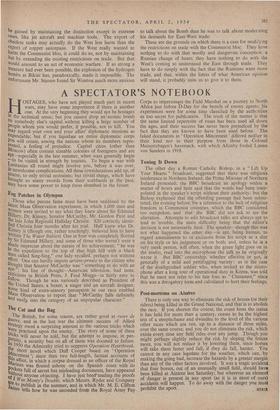Toning It Down
The other -day a Roman Catholic Bishop, in a " Lift Up Your Hearts " broadcast, suggested that there was religious intolerance in Northern Ireland; the Prime Minister of Northern Ireland protested; the BBC broadcast an apology within a matter of hours and later said that the words had been inter- polated in the speaker's script without their authority; but the Bishop explained that the offending passage had been substi- tuted, the evening before, for a reference to the lack of religious freedom in Communist countries, which the BBC considered too outspoken, and that the BBC did not ask to see the alteration. Attempts to edit broadcast talks are always apt to lead to `trouble, the main difficulty being that the editor's decision is not necessarily final. The speaker—though this was not what happened the other day—is apt, being human, to regard amendments to or excisions from his script as a slur on his style or his judgement or on both; and, unless he is a very meek- person, will often, when the green light goes on in the studio, read into the microphone the talk as he originally wrote it. But BBC censorship, whether effective or not, is generally of a mild and pettifogging variety : as in the case of the distinguished soldier who, when invited to the micro- phone after a, long tour of operational duty in Korea, was told that he must not refer to his late foes as " Chinamen," since this was a derogatory term and calculated to hurt their feelings.


















































 Previous page
Previous page